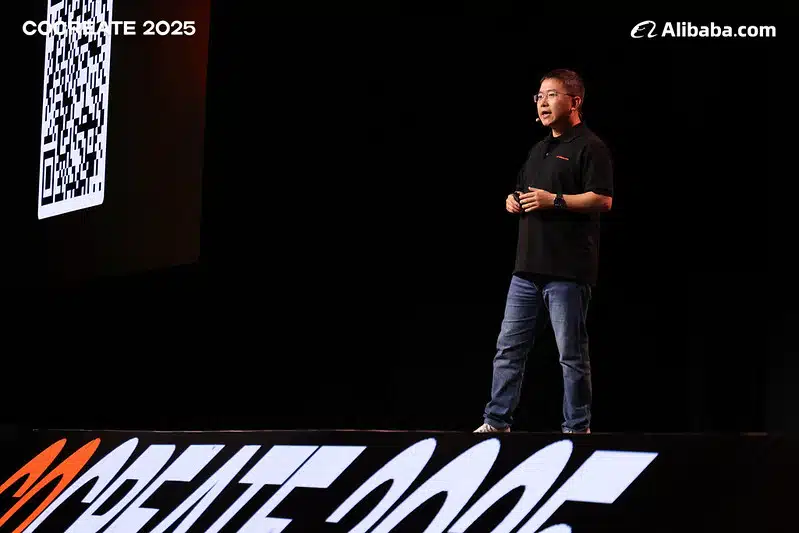Event Title: CoCreate 2025
Event Host: Alibaba.com
Location: Las Vegas, NV, US
Date: September 4-5
Team Member: Matthew DeMello, Emerj AI Research Editorial Director
What Happened
CoCreate 2025, Alibaba.com’s flagship sourcing and entrepreneurship event, convened global leaders from across supply chains, technology, and commerce in Las Vegas. With more than 200 networking sessions, 100 industry experts, and a $1 million startup pitch prize pool, the event positioned itself as the premier stage for sourcing innovation and driving AI-powered commerce transformation.
The two-day gathering featured a combination of main stage keynotes, startup pitch competitions, learning labs, and supplier showcases. Notably, Alibaba.com emphasized the growing role of AI sourcing tools in connecting entrepreneurs to a network of over 200,000 global suppliers.
President of Alibaba.com, Kuo Zhang, opened the event with the keynote “Global Vision, Local Power, We Can Make It, Together”, setting the tone for an agenda built around supply chain resilience, AI enablement, and entrepreneurial opportunity. Other high-profile speakers included Daymond John and Lori Greiner of Shark Tank, Everette Taylor, CEO of Kickstarter, and Stephanie Mehta, CEO of Inc. and Fast Company.

What We Learned
The event highlighted several takeaways shaping the future of sourcing, commerce, and enterprise AI adoption:
- SMB competition reshaped by agentic AI:
Small and medium-sized businesses now have access to enterprise-level supply chain capabilities once reserved for large organizations. Barriers around sourcing expertise, logistics, and compliance are being lowered by automation. AI enables SMBs to ideate, prototype, and execute product design and procurement without the need for large teams, fundamentally changing the competitive landscape. - Enterprise adoption tied to employee enablement:
Alibaba.com’s internal approach to AI adoption demonstrates how large-scale transformation is achieved. Every employee — from engineering to sales — has OKRs or KPIs linked to AI usage. By embedding measurable AI objectives into daily workflows, workers are freed from repetitive tasks and empowered to double or multiply productivity in areas such as code writing, sales outreach, and customer service. The focus is not on replacement, but on enabling employees to handle more projects, ideas, and customer needs.
- Demand and supply remain fundamentals despite disruption:
While tariffs and the pandemic have created turbulence, Zhang emphasized that the fundamentals of commerce remain constant: aligning demand with efficient supply. Supplier diversification, combined with digital sourcing platforms, now enables faster adaptation to shocks. Long-term change is less about short-term disruptions and more about technology’s ability to widen global participation in trade. - Global supply chains as growth engines:
Alibaba.com reported order growth of over 30% year-over-year, underscoring the increasing reliance on digital supply chains. Inter-regional trade, such as within Europe, is already surpassing external trade in volume, revealing untapped opportunities when SMEs can compete internationally. Advances in technology, trust mechanisms such as Alibaba’s Trade Assurance, and logistics innovations are making cross-border sourcing easier and more reliable than ever. - AI is transforming logistics into a predictive value driver:
In a panel featuring an informative exchange between Helen Yi, Head of Supply Chain and Logistics at Alibaba.com, and Silvia Ding, SVP and Managing Director of Maersk Greater China, leaders emphasized how AI is increasingly connecting SMBs to global logistics services and unlocking competitive advantages. Rather than viewing storage and inventory purely as cost centers, advanced AI now enables companies to predict demand more accurately, optimize inventory levels, and ensure availability across markets. Yi noted that the real opportunity lies in “turning storage into a true value enabler,” positioning predictive logistics as a strategic differentiator for businesses aiming to reduce costs, mitigate risks, and expand customer offerings. - AI agents amplify brand voice across customer channels: On the event’s main stage, Vivienne Wei, COO of Salesforce Unified Agentforce, defined AI agents as tools that “use organizational context to act on your behalf.” Reflecting on Agentforce’s launch, she highlighted how both SMBs and enterprises can leverage agents to extend branded language into advertising and customer-facing workflows. Wei stressed that aggregating the right data signals is critical to maximizing this value, concluding that “so long as you’re detecting the right signals, the world is your oyster.”
An exclusive interview with Kuo Zhang, President of Alibaba.com, will be featured on next week’s episode of the ‘AI in Business’ podcast, premiering Tuesday, September 16th, exploring how SMBs and enterprises are using AI to compete in global markets.
Kuo also appears on the September 25th episode of Emerj’s new YouTube series, Vision-to-Value in Enterprise AI, where executives share how they translate AI roadmaps into measurable ROI. Click here to subscribe for more conversations with global AI leaders.
Source link
#CoCreate #Driving #Supply #Chain #Resilience #Agentic #Tools






























